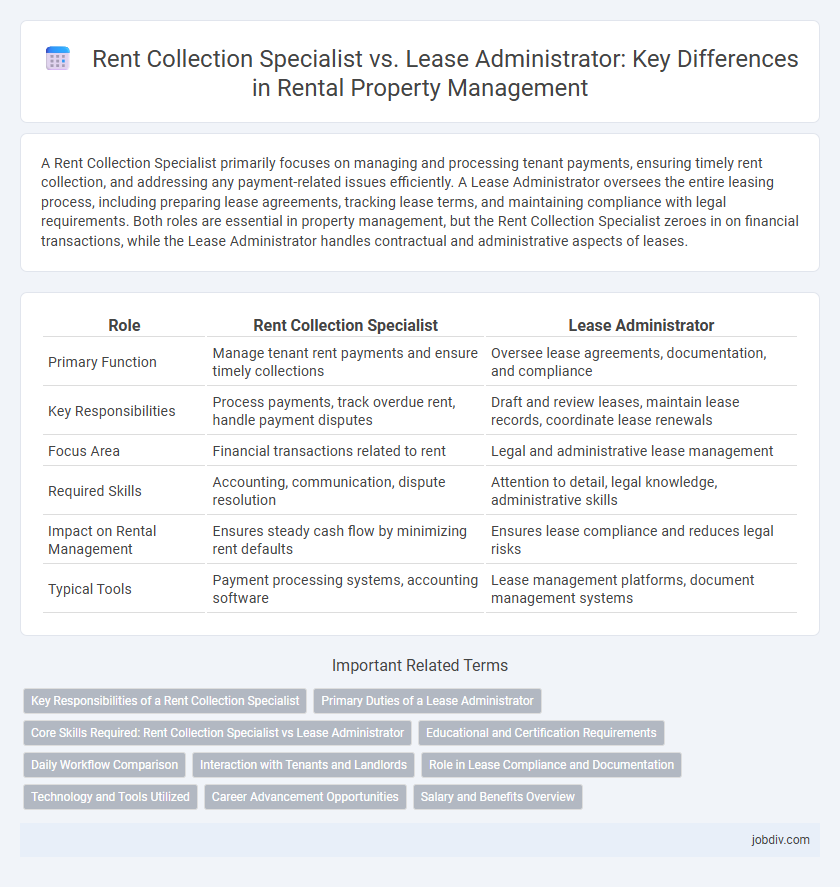A Rent Collection Specialist primarily focuses on managing and processing tenant payments, ensuring timely rent collection, and addressing any payment-related issues efficiently. A Lease Administrator oversees the entire leasing process, including preparing lease agreements, tracking lease terms, and maintaining compliance with legal requirements. Both roles are essential in property management, but the Rent Collection Specialist zeroes in on financial transactions, while the Lease Administrator handles contractual and administrative aspects of leases.
Table of Comparison
| Role | Rent Collection Specialist | Lease Administrator |
|---|---|---|
| Primary Function | Manage tenant rent payments and ensure timely collections | Oversee lease agreements, documentation, and compliance |
| Key Responsibilities | Process payments, track overdue rent, handle payment disputes | Draft and review leases, maintain lease records, coordinate lease renewals |
| Focus Area | Financial transactions related to rent | Legal and administrative lease management |
| Required Skills | Accounting, communication, dispute resolution | Attention to detail, legal knowledge, administrative skills |
| Impact on Rental Management | Ensures steady cash flow by minimizing rent defaults | Ensures lease compliance and reduces legal risks |
| Typical Tools | Payment processing systems, accounting software | Lease management platforms, document management systems |
Key Responsibilities of a Rent Collection Specialist
A Rent Collection Specialist is primarily responsible for managing tenant rent payments, ensuring timely collection, and maintaining accurate financial records related to rent. They handle payment processing, follow up on overdue accounts, and coordinate with tenants to resolve billing issues. Their role focuses on minimizing delinquencies and supporting overall cash flow for rental property management.
Primary Duties of a Lease Administrator
A Lease Administrator primarily manages lease documentation, ensures compliance with contract terms, and coordinates communication between landlords and tenants. They track key lease dates such as renewals, rent escalations, and expirations to maintain accurate records and avoid disputes. Unlike Rent Collection Specialists who focus on payment processing, Lease Administrators handle the broader scope of lease agreement administration and regulatory adherence.
Core Skills Required: Rent Collection Specialist vs Lease Administrator
Rent Collection Specialists require strong financial management skills, proficiency in accounting software, and expertise in tenant communication to effectively manage rent payments and resolve delinquencies. Lease Administrators must possess detailed knowledge of lease agreements, contract compliance, and strong organizational abilities to oversee lease documentation and maintain accurate records. Both roles demand attention to detail and excellent interpersonal skills, but Rent Collection Specialists emphasize payment processing, while Lease Administrators focus on lease lifecycle management.
Educational and Certification Requirements
Rent Collection Specialists typically require a high school diploma or equivalent, with preferred certifications such as Certified Apartment Manager (CAM) to demonstrate expertise in payment processing and tenant communication. Lease Administrators often hold a bachelor's degree in business, real estate, or related fields, complemented by certifications like Certified Property Manager (CPM) or Leasing Specialist credentials to manage lease agreements and compliance. Both roles benefit from training in property management software and legal regulations to ensure efficient rental operations.
Daily Workflow Comparison
Rent Collection Specialists focus on managing payment processing, tracking rent arrears, and communicating with tenants regarding overdue balances, ensuring timely revenue inflow. Lease Administrators handle lease documentation, renewals, amendments, and compliance monitoring, maintaining accurate records and tenant agreements. Both roles require coordination with property managers but differ in daily tasks--one emphasizes financial transactions, the other lease lifecycle management.
Interaction with Tenants and Landlords
A Rent Collection Specialist primarily interacts with tenants to ensure timely rent payments, handle payment disputes, and set up payment plans, enhancing cash flow for property owners. Lease Administrators engage with both tenants and landlords, managing lease agreements, renewals, and compliance while addressing tenant concerns and communicating terms clearly to landlords. Effective coordination between these roles supports smooth operations and tenant satisfaction in rental property management.
Role in Lease Compliance and Documentation
Rent Collection Specialists focus on ensuring timely rent payments and maintaining accurate financial records, playing a vital role in enforcing lease compliance through payment tracking. Lease Administrators handle comprehensive lease documentation, including drafting, reviewing, and maintaining lease agreements to ensure all terms comply with legal standards and organizational policies. Both roles collaborate to uphold lease compliance, with Rent Collection Specialists safeguarding financial adherence and Lease Administrators managing contractual obligations.
Technology and Tools Utilized
Rent Collection Specialists primarily use automated payment platforms, accounting software, and communication tools to streamline rent processing and track payment statuses efficiently. Lease Administrators leverage lease management software, document storage systems, and compliance tracking tools to oversee lease agreements, maintain records, and ensure regulatory adherence. Both roles increasingly utilize integrated property management systems to enhance operational accuracy and tenant satisfaction.
Career Advancement Opportunities
Rent Collection Specialists primarily handle tenant payments and account reconciliations, offering foundational experience in property management finance. Lease Administrators manage lease agreements, amendments, and compliance, developing expertise critical for roles in property law and contract management. Advancing from Rent Collection Specialist to Lease Administrator provides broader responsibilities and skill sets, enhancing career prospects in real estate operations and administration.
Salary and Benefits Overview
Rent Collection Specialists typically earn an average salary ranging from $35,000 to $50,000 annually, focusing primarily on managing tenant payments and delinquencies, often with standard benefits such as health insurance and paid time off. Lease Administrators command higher salaries, averaging between $45,000 and $65,000 per year, due to their broader responsibilities including lease management, compliance, and documentation, often supplemented by enhanced benefits like retirement plans and performance bonuses. Both roles provide vital support to rental operations but differ significantly in compensation and benefits, reflecting their distinct scopes of responsibility.
Rent Collection Specialist vs Lease Administrator Infographic

 jobdiv.com
jobdiv.com